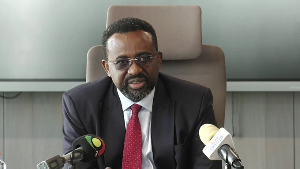Takrowase (E/R), Jan. 3, GNA- Prof. S.K.B. Asante, Fellow of the Ghana Academy of Arts and Sciences and an International Consultant has observed that the nation cannot fully attain its development potentials until Ghanaians resolve to be self - reliant. He said for a nation to be self-reliant it must develop its people and the society as a whole by adopting attitudes such as the will to succeed in life through productive labour, to be resourceful and to conquer new frontiers.
Prof Asante explained that self-reliance and self-sustainment meant the capacity to make indigenous resources the stimuli for development and economic growth and for creating self-renewing societies. He made the observation at the launching of an educational endowment fund at Takrowase in the Kwaebibirem District of the Eastern Region on Thursday.
Prof Asante, who was speaking on the topic "Education as key to self-reliance and self sustaining development", deplored the importation of second hand goods from abroad to flood the home market, making Ghana a nation of shopkeepers.
He said without making any conscientious and sustained efforts towards the production of finished goods and without addressing the weak production structures inherited from the colonial era to reduce the excessive dependence, was certainly not the way to self-reliance and self-sustaining development. He emphasized that "self-reliance and sustainment do not necessarily mean self-sufficiency", rather it was a pattern of regeneration through one's efforts of fighting dominance by beginning to rely on oneself.
Prof. Asante, who is also a Council Member of the National African Peer Review Mechanism Governing Council, said a clear demonstration of the lack of self-reliance and sustainment in the country's development strategy was the uncompromising fragility of the dependence on external aid.
"The degree of that dependence was as such that whenever there were delayed external inflows, government finances were thrown out of balance".
Development based on other people's resources, he said, meant that the country had to meet conditions laid down by others. Others were thus, "given the power to make vital decisions about the political and socio-economic transformation of our country, we should seek to avoid incurring the displeasure of our benefactors or face the threat or reality of the resources being withdrawn from us". Prof Asante explained that it did not mean that development aid, whether bilateral or multilateral should not be accepted or sought, but what it did mean, was that, first, such aid should only be accepted if it complemented, supplemented or acted as a catalyst to local development efforts and did not deflect the nation from its development goals and social policies it had chosen for themselves. He said such development aid as one of its ultimate objectives should aim at making the recipient country more self-reliant than before, adding that, loans for development, whether from bilateral or multilateral sources, should be regarded as the recipient country's own development efforts, since those loans would have to be repaid sooner or later. "Thus, while foreign aid can assist in Ghana's development it cannot substitute for national efforts to develop on the basis of the concepts of self-reliance and self-sustainment," he added.
General News of Thursday, 3 January 2008
Source: GNA
















